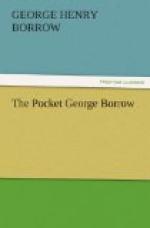‘That is a fine brilliant on your lordship’s hand,’ said I.
‘You are fond of brilliants, Don Jorge,’ said the archbishop, his features brightening up; ’vaya! so am I; they are pretty things. Do you understand them?’
‘I do,’ said I, ’and I never saw a finer brilliant than your own, one excepted; it belonged to an acquaintance of mine, a Tartar Khan. He did not bear it on his finger, however; it stood in the frontlet of his horse, where it shone like a star. He called it Daoud Scharr, which, being interpreted, meaneth light of war.’
‘Vaya!’ said the archbishop, ’how very extraordinary! I am glad you are fond of brilliants, Don Jorge. Speaking of horses, reminds me that I have frequently seen you on horseback. Vaya! how you ride! It is dangerous to be in your way.’
‘Is your lordship fond of equestrian exercise?’
’By no means, Don Jorge; I do not like horses. It is not the practice of the Church to ride on horseback. We prefer mules; they are the quieter animals. I fear horses, they kick so violently.’
‘The kick of a horse is death,’ said I, ’if it touches a vital part. I am not, however, of your lordship’s opinion with respect to mules: a good ginete may retain his seat on a horse however vicious, but a mule—vaya! when a false mule tira par detras, I do not believe that the Father of the Church himself could keep the saddle a moment, however sharp his bit.’
* * * * *
Francis Ardry and myself dined together, and after dinner partook of a bottle of the best port which the inn afforded. After a few glasses, we had a great deal of conversation; I again brought the subject of marriage and love, divine love, upon the carpet, but Francis almost immediately begged me to drop it; and on my having the delicacy to comply, he reverted to dog-fighting, on which he talked well and learnedly; amongst other things, he said that it was a princely sport of great antiquity, and quoted from Quintus Curtius to prove that the princes of India must have been of the fancy, they having, according to that author, treated Alexander to a fight between certain dogs and a lion. Becoming, notwithstanding my friend’s eloquence and learning, somewhat tired of the subject, I began to talk about Alexander. Francis Ardry said he was one of the two great men whom the world has produced, the other being Napoleon; I replied that I believed Tamerlane was a greater man than either; but Francis Ardry knew nothing of Tamerlane, save what he had gathered from the play of Timour the Tartar. ‘No,’ said he, ’Alexander and Napoleon are the great men of the world, their names are known everywhere. Alexander has been dead upwards of two too thousand years, but the very English bumpkins sometimes christen their boys by the name of Alexander—can there be a greater evidence of his greatness? As for Napoleon, there are some parts of India in which his bust is worshipped.’ Wishing to make up a triumvirate, I mentioned the name of Wellington, to which Francis Ardry merely said, ‘bah!’ and resumed the subject of dog-fighting.




